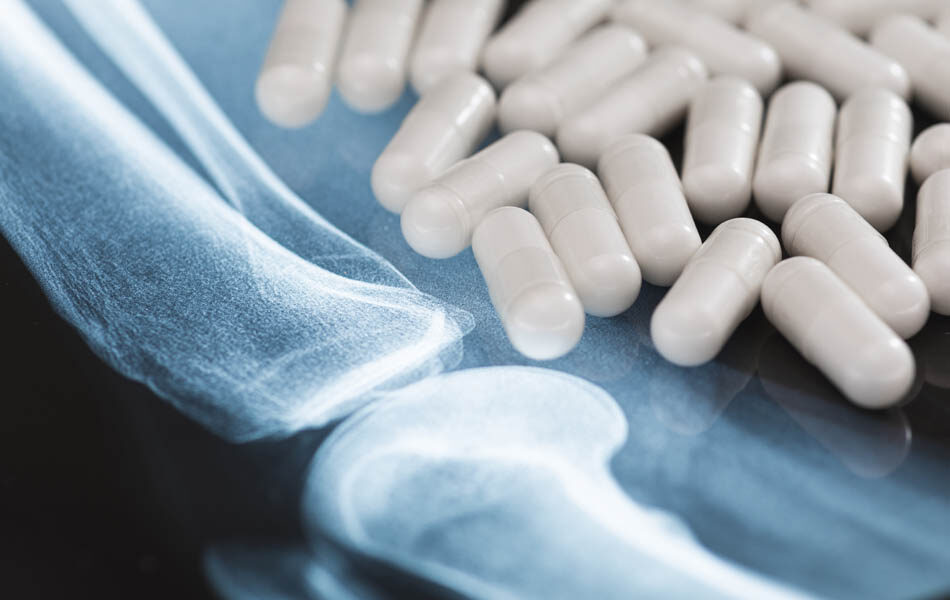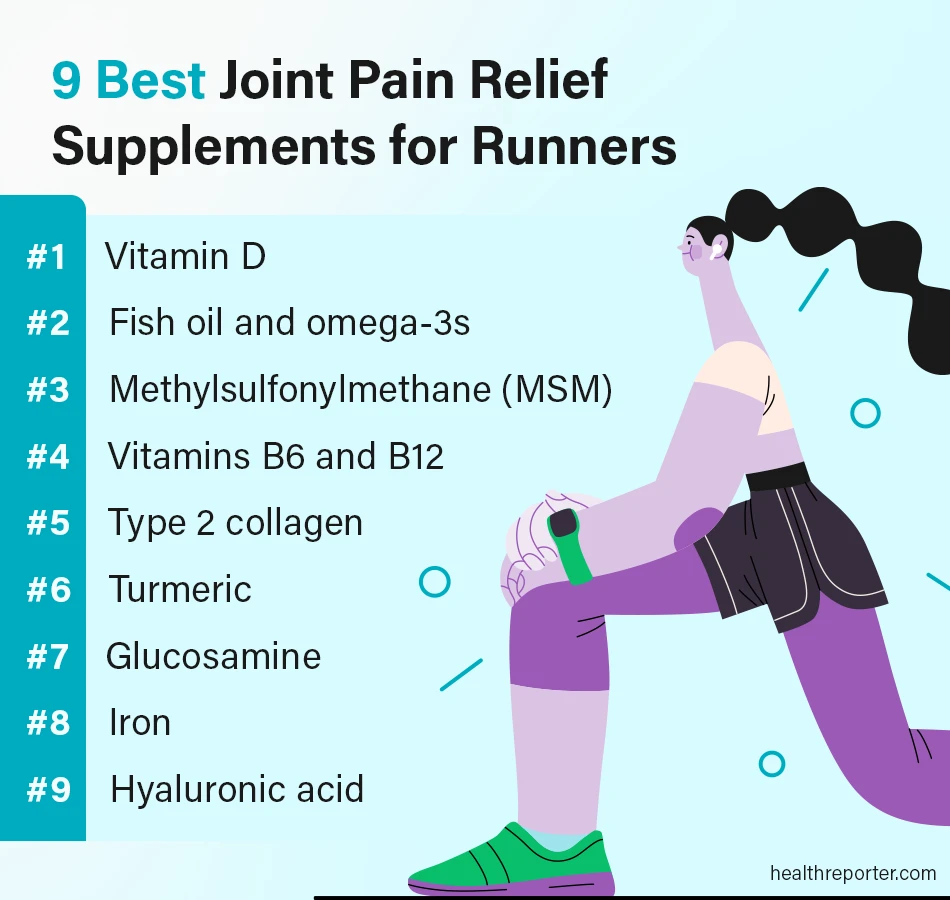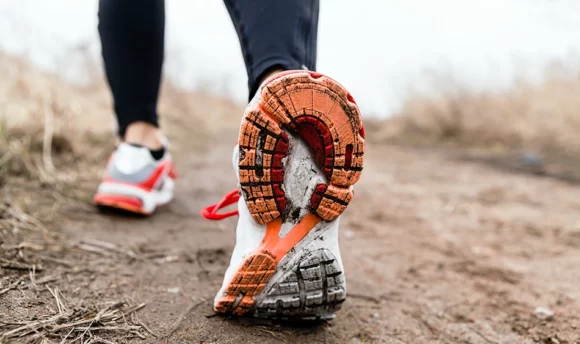9 Best Supplements and Vitamins for Runner's Joints
We’ve heard runners complain about knee pain and joint health. Can certain supplements relieve joint inflammation?

Regular running can provide fantastic health benefits and is an excellent sport to keep the human body performing optimally. It increases energy, helps weight management, and encourages mental well-being.
Yet, we’ve all heard of “runner’s joints.” Running is a high-impact sport. Overtraining, or improper injury prevention, may cause runners to experience joint pain. New and experienced runners suffer from pain in the hips, knees, ankles, spine, and big toes.
But pain in your joints or tendons doesn’t have to stop you from enjoying your favorite sport. Sure, rest days are essential. Yet, joint supplements will relieve pain and prepare your body to work out again. Read our top joint health supplement reviews to improve your running performance.
Joint supplements for runners: Why do you need them?
While running has many benefits for your body, it can cause injuries and stress if you don’t follow a balanced diet and training. Fortunately, joint supplements and vitamins can help runners in multiple ways.
Here’s why finding the best joint supplement is important:
- High-impact sport: runners’ joints are more prone to injury. This is especially the case around the knees, ankles, and hips. Supplements strengthen bone health and cartilage tissue to improve injury prevention.
- Recovery times: Delayed onset muscle soreness can make it hard to convince yourself to complete your training program. Joint supplements can reduce pain and encourage quicker recovery.
- Rheumatoid arthritis: Running has a protective effect against arthritis. Taking joint health supplements with anti-inflammatory properties might ease joint function.
9 Best Supplements for Runner’s Joints
The body is like a machine with many moving parts. Sometimes, recovery rest days and healthy nutrition aren’t enough. So what is the best joint supplement for athletes?
Our top choices are scientifically proven to reduce joint pain and support athletic performance.

Read on to discover each joint supplement’s pros and cons and how they can help you get rid of annoying pain.
#1 Vitamin D
Vitamin D supplements promote skin and bone health. Additionally, they help the body absorb calcium and phosphorus. Vitamin D ensures you maintain a pearly white smile and helps runners look after their joint health.
Many people get all the vitamin D they need from the sun. Yet, people in the northern parts may need to take supplements during winter. Or, you can get small doses of vitamin D through fish, shellfish, egg yolk, fortified milk, yogurt, orange juice, and cereals.
Insufficient vitamin D can cause osteoporosis. It might also lead to stress-related fractures and skeletal diseases, among other conditions. Weak or soft bones may impact your running performance and lead to increased injury risk or joint problems. Runners should consider vitamin D joint health supplements, especially if they don’t see much sunlight.
Recommended dose: 600 international units (IU) of vitamin D for people aged 1–70 years and 800 IU for people over 70 years.
| Advantages | Side effects (if overused) |
|---|---|
| Increases bone health | Nausea and vomiting |
| Prevents stress-related injuries | Poor appetite and weight loss |
| Prevents degenerative bone disease | Constipation |
| Weakness | |
| Confusion and disorientation | |
| Heart rhythm problems | |
| Kidney damage |
#2 Fish oil and omega-3s
Omega-3 fatty acids are essential ingredients for healthy joints. Cold-water oily fish, such as salmon, herring, and sardines, are the best sources of omega 3. You can also find them in chia seeds, walnuts, and flax seeds.
Omega-3 fats contain EPA and DHA that help maintain normal brain, heart, and eye functions. Omega-3 supplements have powerful anti-inflammatory properties. These reduce post-workout muscle soreness and increase blood flow to speed up recovery. Well-oiled, healthy muscles can prevent joint stiffness and reduce the chances of injuries.
One study found that subjects taking fish oil supplements were less stiff and sore and had a higher range of motion after exercise.
Recommended dose: 1.1 grams for females and 1.6 grams for males
| Advantages | Side effects (if overused) |
|---|---|
| Relieves joint pain | Stomach upset |
| Lowers blood pressure | Loose stools |
| Improves muscle recovery | Nausea |
| Reduce inflammation around sore joints | |
| Keep joints lubricated | |
| Improves bone and joint health | |
| Prevents osteoporosis and arthritis |
#3 Methylsulfonylmethane (MSM)
Methylsulfonylmethane (MSM) is a sulfur-based supplement with pain relief and anti-inflammatory effects. A 2017 study found that runners taking MSM recovered quicker from muscle and joint pain after completing a half-marathon.
MSM forms collagen, which helps build cartilage. Cartilage tissue is an essential protective layer around joints and bones. This supplement is also beneficial for your hair.
As you get older, your body produces less collagen. Runners need healthy joints and cartilage for physical activity. They might need MSM joint supplements to produce the necessary collagen to help keep runner knees and joints healthy and strong.
You can find MSM in fruit, tea, coffee, and milk. Still, many of us need to take MSM as a joint supplement to receive the recommended intake. Those suffering from knee pain or other joint issues might consider taking MSM to fight inflammation.
Recommended dose: There are no recommended optimal doses for MSM. Most people can tolerate up to 4 grams of MSM.
| Advantages | Side effects (if overused) |
|---|---|
| Reduces joint pain | Constipation or diarrhea |
| Can help battle osteoarthritis | Allergic reactions |
| Anti-inflammatory effects | Stomach upset |
| Improves joint mobility | Trouble sleeping |
| Speeds up muscle recovery and stress |
#4 Vitamins B6 and B12
Vitamins B6 and B12 are some of the most common nutritional deficiencies among runners. Adequate amounts of them help maintain optimal functioning of the body, including:
- Cardiovascular health
- Energy balance
- Protein metabolism
These are all essential functions for runners.
Vitamin B12 aids other supplements and nutrients. Deficiencies can impair performance and endurance, which increases joint injury chances. Vitamin B6, on the other hand, helps transport oxygen around the body and convert proteins into energy.
If you have poor joint health, consider taking vitamins B6 and B12 to keep your body strong and efficient.
Recommended dose:
| Advantages | Side effects (if overused) |
|---|---|
| Promote brain health | A lack of muscle control |
| Boost immune system | Heartburn, headache, and nausea |
| Decrease joint pain | Sensitivity to sunlight |
| Reduce inflammation around the joints and muscles | Numbness |
| Improve energy levels | Reduced pain or temperature sensitivity |
| Support bones and prevent osteoporosis | Diarrhea |
| Fatigue or weakness |
#5 Collagen
Collagen is a fibrous protein found in bones and connective tissues. We mostly need 3 types:
- Type 1: Reinforce bone construction
- Type 2: Used in cartilage; has a rigid construction that helps shock absorption
- Type 3: Major component in internal organs and skin
Collagen can reduce injuries and enhance recovery in runners and athletes. Shock absorption and cartilage preservation prevent knee pain and reduce joint pain. Collagen production is natural, but nutrition and joint pain supplements can boost collagen.
Those with recent injuries might take a joint collagen supplement to support connective tissue repair. Collagen-rich foods include:
- Bone broth
- Egg
- Meat
- Fish
Recommended dose: 5 grams per day to improve bone density
| Advantages | Side effects (if overused) |
|---|---|
| Bone loss prevention | Headache |
| Keeps joints lubricated | Digestive issues |
| Reduces joint inflammation | Fatigue |
| Preserves cartilage | |
| Supports injury recovery |
#6 Turmeric
Turmeric is a staple in many curry recipes, but did you know it can act as a joint supplement?
Turmeric contains anti-inflammatory molecules called curcumin. This can prevent chronic inflammation in knee arthritis or runners’ joint pain. Turmeric is particularly beneficial in treating acute pain. It has also been known to promote post-workout recovery, reducing muscle soreness.
Recommended dose: 4 grams per day. Supplements are better than powder to reap the full benefits as they contain a 95% concentration of curcumin.
| Advantages | Side effects (if overused) |
|---|---|
| Contributes to the normal function of joints | Nausea |
| Helps with acute pain relief | Digestive issues |
| Helps aid digestion | Dizziness |
| Treats arthritis | |
| Anti-inflammatory | |
| Positive effects on brain function and cardiovascular health |
#7 Glucosamine
Glucosamine is an amino sugar found in cartilage. Glucosamine supplements can relieve knee pain and joint stress and help heart health.
Glucosamine sulfate (GS), a sugar molecule found in shellfish and within the body, in particular, has been linked to treating chronic and painful osteoarthritis, yet further research is necessary to prove its effectiveness.
The glucosamine supplement encourages cartilage production, which is essential for high-impact sports like running. It also has anti-inflammatory properties, provides pain relief, and is particularly good for knee pain and slowing the breakdown of joints.
Lately, glucosamine in capsules and other supplements is often combined with chondroitin, another component of cartilage that may help maintain elasticity and promote joint recovery.
Recommended dose: 1,250–1,500mg per day for best results
| Advantages | Side effects (if overused) |
|---|---|
| Pain management | Constipation |
| Slows joint deterioration | Diarrhea |
| Supports joint health | Fatigue |
| Anti-inflammatory | Gastrointestinal discomfort |
| Relieves knee osteoarthritis | Headache and nausea |
#8 Iron
Iron is crucial for runners. It supports oxygen flow, energy levels, and performance. One of the most-known symptoms of iron deficiency is fatigue. When we’re feeling tired, our running style and endurance will suffer. So, you may not practice proper form, which can lead to strains and injuries – especially around joints.
Food is a good source of iron. You can get iron from meat, liver, soybeans, vegetables, and fortified grain products.
If you suffer from joint pain and are iron deficient, supplements could help you make it to the finish line in good condition.
Recommended dose: 8–15mg for females; 8–11mg for males
| Advantages | Side effects (if overused) |
|---|---|
| Treats fatigue | Backache or muscle pain |
| Enhances athletic performance | Headache |
| Supports energy levels | Nausea or vomiting |
| Improves mental performance |
#9 Hyaluronic acid
Taking hyaluronic acid supplements can aid knee or joint pain relief. One study suggests hyaluronic acid supplements can relieve pain and strengthen muscles.
Hyaluronic acid binds with water to produce a viscous fluid. This lubricates the joints and acts as a shock absorber – valuable for runners. Also, hyaluronic supplements can help aid cartilage and bone growth by promoting new cells and tissues. Runners will see improved recovery times after workouts with greater muscular strength.
Finally, hyaluronic supplements can reduce joint inflammatory molecules caused by injury or degeneration.
Most runners will take hyaluronic supplements orally. However, you may have to take injections if you suffer from joint injuries or degenerative issues.
Recommended dose: 200–1,000mg per day
Here are the benefits of hyaluronic acid from injections and its possible side effects.
| Advantages | Side effects (if overused) |
|---|---|
| Joint lubrication | Pain |
| Strengthens muscles | Bruising |
| Relieves joint pain | Redness |
| Reduces inflammation | Itching |
| Shock-absorbing properties |
No notable side effects are noted for oral hyaluronic joint supplements.
A Word From Our Coach
If you’re looking for the best joint supplement, you might consider which micro nutrients support your joint health the best. Vitamins, iron, collagen, and other supplements help reduce inflammation and relieve joint pain.
Studies suggest glucosamine, turmeric, and MSM can do more than speed up running recovery times. With improved heart and brain health, running joint supplements can support every aspect of your life.
Yet, every runner’s joints are different. The correct dose and supplements depend on the type of joint stress and your active lifestyle. Speak to a healthcare professional about the best supplements for your joint health.
Conclusion
Taking the right joint supplement to ease knee pain or treat arthritis can improve your running performance. With quicker recovery times and less chance of developing a chronic joint condition, you’ll fall in love with running again.
Remember that a joint supplement alone won’t ensure pain-free and effective training. You should also follow a balanced diet and keep your workout load at an adequate level. In case of chronic or intense pain, speak to a physical therapist first.
Leave a comment

















































 Select your language:
Select your language: 









Really helpful page , guide you on how to help your runners knee excellent